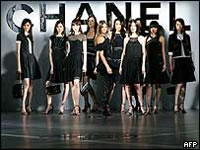China's economic growth over the past few years has given rise to a new wealthy elite looking for ways to spend their money.
"You can see it in designer shops in Shanghai and Beijing," says Angelica Cheung, the editor-in-chief of the newly launched Vogue China.
"People who are not particularly tastefully dressed go into shops with briefcases of cash and say 'I want that one. What's this; oh it's an Italian brand. Yes, then I want that'."
According to a new survey by Ernst and Young, China is expected to surpass the United States to become the world's second largest consumer of luxury goods within a decade.
Japan currently dominates the global market, with 41% of all luxury brand sales.
It is predicted China will have a 29% share by 2015.
Sales of luxury cosmetics and clothing are growing at 20% a year.
Showing off
At the same time, the sophistication level of China's luxury consumers is rising fast.
Yvonne Han is one of two partners in a successful Shanghai chain of restaurants.
She dresses in Prada or Gucci, drives a BMW and owns a stylish apartment in the heart of the city. She is on a salary of $4,000 a month plus a share of the business' monthly profits. And as she does not pay rent, almost all of her income is disposable, so each month she spends $5,000 on luxury labels.
While Ms Han prefers understated fashions herself, she says many of her friends like to flash their new-found wealth with more obvious status symbols.
"Europeans like to spend money on travel, on the enjoyment of life," she says.
"In China, people like to show off with material things, like my friend, he bought a Porsche 911.
"Actually, having a Porsche is quite pointless here because the roads in Shanghai are so congested, but it can show off how rich he is."
Fakes and taxes
There are half a million dollar-millionaires in China today, and an estimated 30 million people who can afford luxury products.
Many of those are not yet regular luxury buyers, but many aspire to that lifestyle.
According to Ms Cheung at Vogue, "Many white-collar workers in China's cities want to impress people and raise their social status.
"There are many young girls who save up 2-3 months' salary to spend on a Louis Vuitton handbag. They may work as secretaries, but having the bag gives the impression that they come from a wealthy family or have a rich boyfriend, and in both cases, it attracts a lot of envy from their girlfriends."
As the Chinese market expands and matures, brand building is becoming increasingly important.
Chanel recently splashed out on an exclusive party in Shanghai, inviting Chinese film stars, models and local business tycoons for a ride on Shanghai's 430 km/h (270 mph) Maglev train.
The company then staged a catwalk show of its autumn and winter collection at the international airport.
Although Chanel was a latecomer to the Chinese market, the company has increased its presence from two cities in 2002 to 23 cities today. It plans to be in 40 cities by 2008.
But luxury goods companies in China still face two problems: the proliferation of counterfeits and high import duties.
Products on the mainland cost on average 20% more than in Hong Kong, yet people like Yvonne Han are still willing to pay for the real thing, because these luxuries were unimaginable 20 years ago.




 By: N. Peter Kramer
By: N. Peter Kramer
